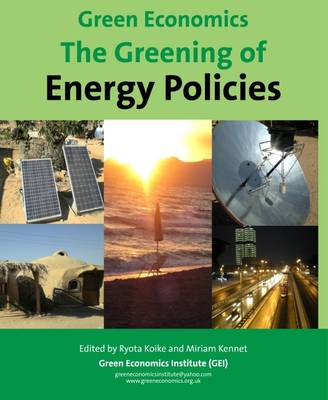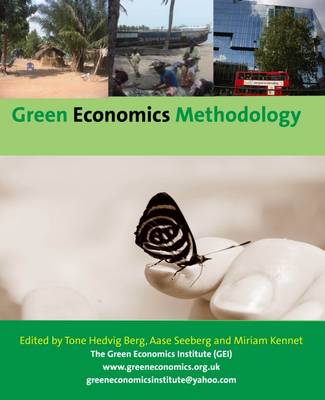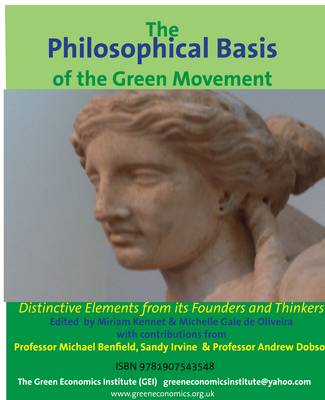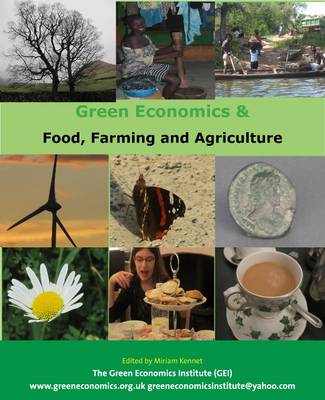Handbook of Green Economics
2 primary works • 4 total works
Book 8
Green Economics: The Greening of Energy Policies
by Ryota Koike and Miriam Kennet
Published 30 August 2012
Green Economics and Energy Policy An introduction for the general reader who wants to understand green economics and also the latest thinking about energy in one easy to read volume. Working in the context of post Fukushima (Japan) and Chernobyl(Ukraine) as well as the Institute which created the academic discipline of Green Economics,(UK),this book provides a completely new round up of the current state of innovation in energy policy and life style changes for the success of all of us in the 21st century and our survivability. Introduces the reader to the important and innovative state of the art developments and aspects of both Green Economics and the measures being used to combat climate change and to meet the challenges of an increasing global population whilst at the same time changing life styles, using technology and policy and regulation.Green Economics has emerged as a counterpart to mainstream orthodox economics. Having seen the main-stream economics failure in connecting nature and human activities there have been countless problems emerging, which harm the people and marginalize the poor around the world.As a result, Green Economics has developed its entirely new and exciting discipline or school of economics.
Green Economics is based on a different ethics about economics and takes alternative and innovative perspectives on the global issues, suggesting new options and solutions affordable to society in the age of resource scarcity and global climate change. As business-as-usual approach dominates the mainstream, the world is facing unseen problems which have not been previously witnessed in our history. The global population has reached 7 billion and is likely to reach 8.5 billion by 2050 and global electricity demand is expected to increase by 80% by 2040, which exceeds the ecological carrying capacity. Having acknowledged the situation, this book aims to provide focus on the issues raised by current energy policies with a diverse group of researchers from around the world. The book also examines the risks of nuclear energy and suggests a blueprint for a transition to a low carbon society by developing renewable energy. It helps illustrate the way of re-examining such costly energy policies and dangerous nuclear disaster scenario.
Green Economics is based on a different ethics about economics and takes alternative and innovative perspectives on the global issues, suggesting new options and solutions affordable to society in the age of resource scarcity and global climate change. As business-as-usual approach dominates the mainstream, the world is facing unseen problems which have not been previously witnessed in our history. The global population has reached 7 billion and is likely to reach 8.5 billion by 2050 and global electricity demand is expected to increase by 80% by 2040, which exceeds the ecological carrying capacity. Having acknowledged the situation, this book aims to provide focus on the issues raised by current energy policies with a diverse group of researchers from around the world. The book also examines the risks of nuclear energy and suggests a blueprint for a transition to a low carbon society by developing renewable energy. It helps illustrate the way of re-examining such costly energy policies and dangerous nuclear disaster scenario.
Book 10
An Green Economics Methodology: An Introduction
by Aase Seeberg, Tone Hedberg, and Miriam Kennet
Published 2 November 2012
Were you aware that due to dangerous and runaway climate-change, much of humanity may be forced to migrate, towards the Polar Regions and to live together at a density previously unimaginable, as many of the other areas of the planet may become uninhabitable or unable to sustain our crops or our food? Scientists predict this is a realistic scenario if we do not change the way we treat our planet. HurricaneSandy is just the latest episode in this process. The cost of Sandy has been estimated up to US $60 billion, and this is, according to many scientists, only just the beginning of what they have predicted! We,human beings and our economy, are entirely dependent on benevolent climatic conditions, in which we can thrive and on which our entire " civilisation" has developed up to now. We don't really know what will happen under very different conditions! The New York Stock Exchange for example had to be shut down for the first time in years, because of the hurricane. Are you concerned about environmental problems, but always wondered how, for example, climate change will affect you and your society, and wondered what can be done?This book will introduce you to what Green Economics is, and how you can take a critical look at the mainstream economic modelswhich are used in today's economy.
The book is an edited volume and a compilation of essays, views, speeches about Green Economics its the methodology. It includes a wide range of the background discourse of Green Economics and how it already has affected politics in different societies and challenges main stream assumptions. You will find discussions on how Green Economics questions and replaces basic economic ideas such asgrowth, mass consumption and savings, and also how Green Economics gives the reader knowledge ofhow we can meet the challenges of climate change and the degradation of biodiversity. Some articles discuss other environmental approaches for example sustainable development and the Stern Review. In the last few years, there has been a dramatic increase in interest in environmental problems and the transformation towards Green Jobs and a Green Economy.Inequalities between people, within and between nations, and between present and future generations as well as social and environmental destruction is threatening the human species, but today's global mainstream economy does not seem to take these risks into account (Kennet 2012).
15 Green Economics Methodology : An Introduction So, an important question is to ask is, what is Green economics? According to Jociute and Turk (2011) the world has changed, and Green Economics, as a discipline which inherently takes account of the long term effects of widespread population inequality, climate change and biodiversity loss, has been waiting to take the mantle. Its time has now arrived. Green economics looks at the current dualism between ecology and the economy, and argues that these two must go hand in hand together, because mass consumption in today's world leads to the exhaustion of natural resources and it risks even causing the extinction of the human species. Today's markets are correctly reflecting and indicating that traditional economic instruments and tools are no longer are working (Jociute and Turk 2011).Therefore new methods of creating a more natural "economics of abundance, " a truly green economics need to be urgently developed and implemented and this book tells its story so far and how to use it in your work and your activities and also how to nuture this small seed of hope which is doing the rounds of governments all over the planet.
Green Economics is at once a beacon of hope for a more equitable planet and also one of the most exciting drivers of contemporary world economics innovation! 16
The book is an edited volume and a compilation of essays, views, speeches about Green Economics its the methodology. It includes a wide range of the background discourse of Green Economics and how it already has affected politics in different societies and challenges main stream assumptions. You will find discussions on how Green Economics questions and replaces basic economic ideas such asgrowth, mass consumption and savings, and also how Green Economics gives the reader knowledge ofhow we can meet the challenges of climate change and the degradation of biodiversity. Some articles discuss other environmental approaches for example sustainable development and the Stern Review. In the last few years, there has been a dramatic increase in interest in environmental problems and the transformation towards Green Jobs and a Green Economy.Inequalities between people, within and between nations, and between present and future generations as well as social and environmental destruction is threatening the human species, but today's global mainstream economy does not seem to take these risks into account (Kennet 2012).
15 Green Economics Methodology : An Introduction So, an important question is to ask is, what is Green economics? According to Jociute and Turk (2011) the world has changed, and Green Economics, as a discipline which inherently takes account of the long term effects of widespread population inequality, climate change and biodiversity loss, has been waiting to take the mantle. Its time has now arrived. Green economics looks at the current dualism between ecology and the economy, and argues that these two must go hand in hand together, because mass consumption in today's world leads to the exhaustion of natural resources and it risks even causing the extinction of the human species. Today's markets are correctly reflecting and indicating that traditional economic instruments and tools are no longer are working (Jociute and Turk 2011).Therefore new methods of creating a more natural "economics of abundance, " a truly green economics need to be urgently developed and implemented and this book tells its story so far and how to use it in your work and your activities and also how to nuture this small seed of hope which is doing the rounds of governments all over the planet.
Green Economics is at once a beacon of hope for a more equitable planet and also one of the most exciting drivers of contemporary world economics innovation! 16
Philosophical Basis of the Green Movement
by Mike Benfield, Miriam Kennet, Michelle Gale De Oliveira, and Sandy Irvin
Published 1 October 2013
After 50 years of materialist culture, people are desperately seeking answers to such questions as the proper sharing of the bounty of the planet and also the human economy. Who should have and who should have not and can inequality ever be justified. Should humans take every last benefit from the planet or do we need other species and do we need to learn to share and to respect nature. We are not alone on this planet but we might be a very short lived species if we dont get a grip on our proper role. This unique book brings texts and discussion from some of the founders of the green movement and makes todays' philosophy accessible and usable for everyone! The main features of philosophical possibilities for the 21st century and brings the light of Green Movement thinking to bear on todays issues. The Green Movements' original philosophical questions and conundrums in the light of todays' challenges.Shinning a very modern light on Classical texts This book introduces the philosophical basis and understanding of the Green Movements' amazingly accurate predictions on climate and global environmental physical and political change to a broader group of readers, students, policy makers, academics and campaigners in this ground breaking volume.
The Greening of Food, Farming and Agriculture
by Miriam Kennet, Michelle Gale De Oliveira, and Rose Blackett Ord
Published 1 May 2013
This innovative book charts the latest thoughts on food, farming and agriculture in a world of increasing inequality, climate instability and biodiversity loss. With a team of writers from around the world this book helps argue for change across the range of food issues, right from seeking alternatives to agribusiness and towards a more humane and human scale and also includes helpful receipies for the reader to try out from a well known food writer! combining economics, food, human rights, poverty and climate change -this book makes waves!



